We did an intensive analysis of various factors such as academic excellence, tuition costs, recreational activities compared to other colleges in the state and the nation to list the best colleges in Michigan. Most schools do not use test scores as an essential requirement during the admission process because of the impact of the coronavirus on students’ ability to take tests at in-person centers. However, other aspects, such as GPA, are considered. Colleges in Michigan are affordable as they have low tuition and offer financial aid providing a high standard of education. They offer students learning-living communities that foster intellectual growth, leadership, and dignity.
2024’s Best Colleges in Michigan
- University of Michigan – Ann Arbor
- Michigan State University
- Michigan Technological University
- University of Michigan – Dearborn
- Andrews University
- Lake Superior State University
- Calvin College
- Grand Valley State University
- Kuyper College
- University of Detroit Mercy
University of Michigan – Ann Arbor
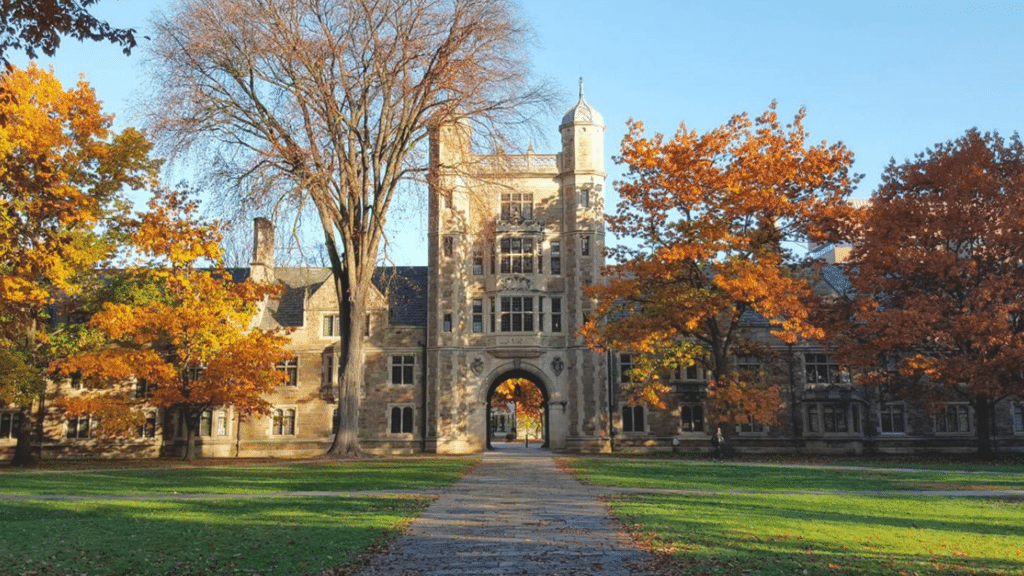
University of Michigan (UM) is a public research university that was established in 1817.
UM ranks 1st in research volume compared to other research universities in the US. The university spent $1.6 billion in research expenditure in 2019. In 2020, over 1500 students took part in the Undergraduate Research Opportunity Program. UM has over 900 student-athletes and 29 NCAA Division I teams. UM reported had 503 new inventions and 33 new business startups in 2020.
UM was ranked the 5th Best Hospital in the US and the 15th Best Hospital in the World in 2020. It ranks 1st in colleges in Michigan and 24th in National Universities. UM comes 3rd in National Undergraduate Public Universities and 3rd in Top Public Schools.
UM has a 24% acceptance rate and a 92% graduation rate. The 2020 class had an average SAT score between 1380 to 1550 and an average ACT range between 32 to 35. They have an average high school GPA of 3.9.
In-state students pay $15,945 while out-of-state students pay $52,263 for tuition and fees. Students whose family income is less than $65,000 and have assets that are less than $50,000 are eligible for free education. 25% of Michigan residents receive financial aid that covers the full cost of tuition.
UMich has 19 colleges and schools and offers over 275 degree programs. Here are some of those programs:
- Aerospace Engineering
- Biopsychology, Cognition, and Neuroscience
- Dental Hygiene
- Evolutionary Anthropology
- Gender and Health
- History of Arts
- Informatics
- Jazz and Contemporary Improvisation
- Linguistics
- Organizational Studies
- Political Economy and Development
- Social Theory and Practice
- Theatre & Drama
- Winds and Percussion
Michigan State University
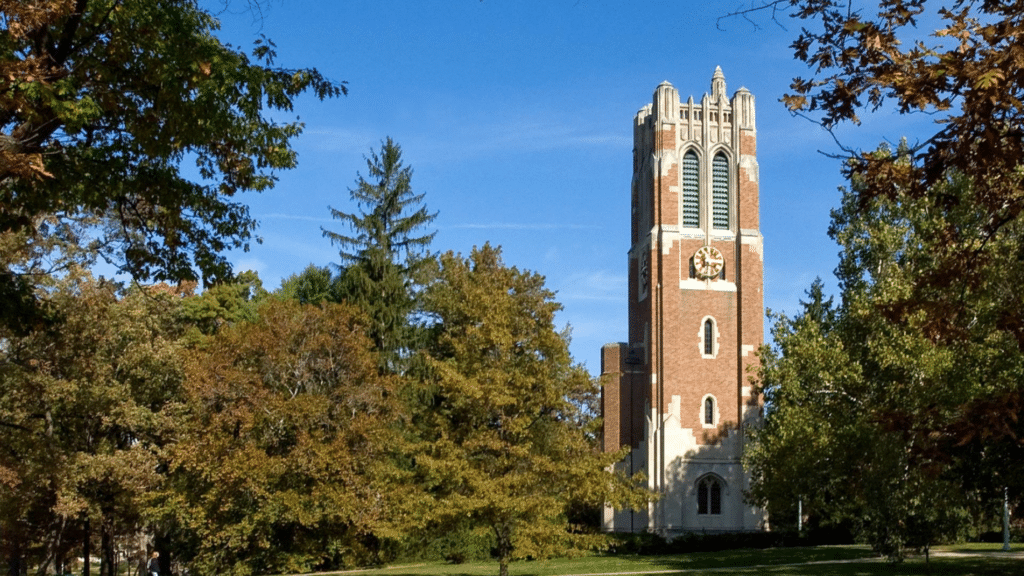
Michigan State University (MSU) is a public research university founded in 1855, and it is the first land-grant school in the US. MSU provides academic support and encourages undergraduate research under the close supervision of world-renowned researchers. Additionally, MSU encourages students to push boundaries and make new connections.
MSU has 38 programs that make the list of top 25 in the US. It is the 2nd top college in Michigan and 80th in National Universities. It ranks 32nd in Top Public Schools and 50th in Best Colleges for Veterans.
MCU has a 71% acceptance rate and a 78% graduation rate. 50% of enrolled freshmen in Fall 2021 had an average SAT score between 1110 to 1310, composite ACT scores between 23 to 29, and average high school GPA between 3.5 to 4.0.
In-state freshmen pay $14,914, out-of-state freshmen pay $40,276, while international freshmen pay $42,226 for fees and tuition. In the 2020/2021 academic year, MSU awarded $1.2 billion in financial aid, and 69% of MSU freshmen received financial aid.
MSU graduates have an average starting salary of $54,209 annually and a median salary of $55,000 annually. 77% of MSU students complete an internship in their undergraduate years, and recent graduates have a 94% placement rate. 62.2% of graduates are employed while 25.2% of them are furthering their education.
Here are a few programs out of the 200+ programs that MSU offers:
- Advertising Creative
- Biomedical Laboratory Science
- Child Development
- Dietetics
- Horticulture
- Journalism
- Landscape Architecture
- Microbiology
- Nutritional Sciences
- Physiology
- Statistics
- Theatre
- Veterinary Medicine
- World Politics
- Zoology
Michigan Technological University

Michigan Technology University (MTU) is a government-owned research university that was founded in 1885. Students are constantly challenged to seek more creative solutions to different problems while keeping their mental/physical health in check. Undergraduates have 110,000 research hours, and the university has $77.9 million for research expenditure. MTU encourages sports, evident in its 14 varsity sports and 3 NCAA Division I titles.
MTU ranks 80th in National Universities and 3rd in Michigan college rankings. In 2019, MTU ranked 29th in Public Universities, the 8th Public School in the nation that pays off the most, and 13th in Best Colleges with no application fee.
MTU has a 74% acceptance rate and a 72.2% graduation rate. Freshmen had an average SAT score of 1252, ACT scores between 25 to 30, and an average high school GPA of 3.8.
Almost 90% of MTU students receive some form of financial aid. First-time international students seeking a degree for the first time can get merit-based financial assistance of $12,400. Michigan residents pay $16,654, while non-Michigan residents pay $37,800 for tuition annually.
The median undergraduate salary is $64,740. Graduates have a 93% placement rate after five years.
Here are some majors offered at MTU:
- Accounting
- Bioinformatics
- Cybersecurity
- Data Science
- English
- Forestry
- Geophysics
- Human Biology
- Marketing
- Natural Resources Management
- Psychology
- Robotics Engineering
- Sound Engineering
- Theatre and Electronic Media Technology
- Wildlife Ecology and Conservation
University of Michigan – Dearborn
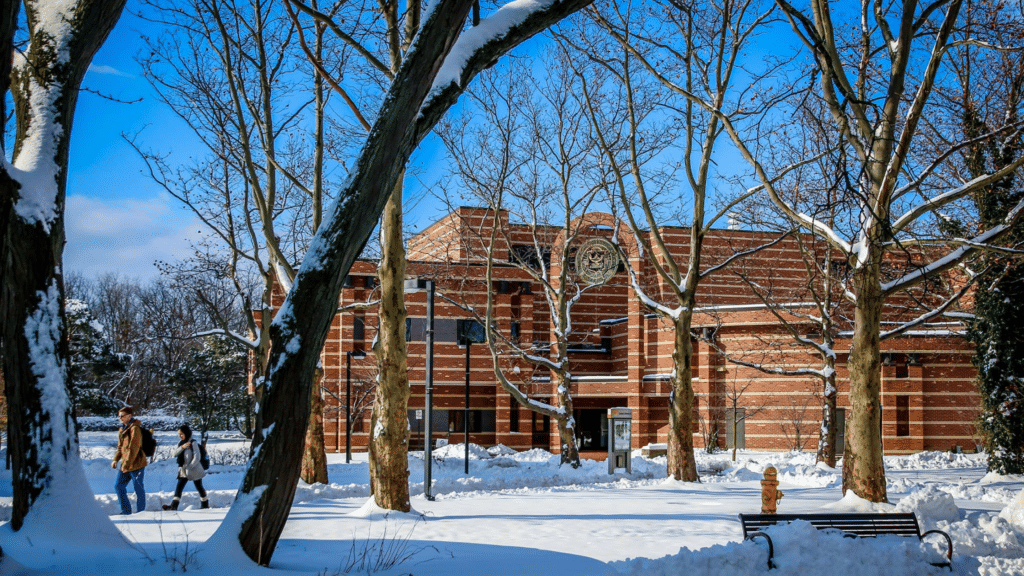
The University of Michigan-Dearborn is a public university whose mission is a caring, inclusive and student-focused institution. It provides affordable education and emphasizes creating impact in its students and the community. Dearborn has small class sizes and promotes diversity and creativity. In 2020, Dearborn had $10,036,748 for sponsored funding and external research.
Dearborn ranks 31st in Regional Universities Midwest, 22nd in Top Performers on Social Mobility, 23rd in Best Colleges for Veterans, and 4th in Top Public Schools.
In-state students pay $13,552, while out-of-state students pay $27,520 for fees and tuition in one academic year. 88% of students at UM-Dearborn receive financial aid in the form of scholarships, grants, and loans to help them enroll and help them graduate. Veterans can also get Veterans Aid education benefits.
Dearborn graduates have the 2nd highest starting salary among 15 Michigan public universities. They earn an average salary of $131,000 10 years after graduating.
These are some majors available at UM-Dearborn:
- Applied Statistics
- Behavioral and Biological Sciences
- Cybersecurity and Information Assurance
- Digital Marketing
- Elementary Education Teaching
- French
- General Business
- Health and Human Services
- Instructional Technology
- Journalism and Screen Studies
- Mathematics
- Professional Writing and Rhetoric
- Robotic Engineering
- Sociology
- Urban and Regional Studies
- Women’s & Gender Studies
Andrews University

Andrews University is a private Christian higher institution that was founded in 1974. Seventh-Day Adventists own it, and it is the first and best known Adventist school worldwide. Andrews fosters a cocktail of a close relationship with God, strong moral values, and excellent education. It follows biblical principles on diversity and inclusion by sharing the love of Christ to all and sundry through rich curricular and curricular encounters. Eligible students can study abroad in any ten available locations and fully immerse themselves in cultures and languages.
Andrews is one of the best private universities according to Michigan universities ranking. It ranks 303rd in Top Performers on Social Mobility.
Andrews doesn’t require test scores such as SAT or ACT. Domestic and international students who studied in any language other than English have to submit English proficiency test scores. Students must have a minimum high school of 2.75, but the Bridge Success Program can help those with a lower GPA get admission.
Students have to pay $30,552 as tuition costs every year. Students get an average amount of $6,050 annually in financial aid.
Students can choose from any of the 94 undergraduate programs and 67 graduate programs that the university offers. Here are some academic programs:
- Art
- Business Administration
- Communication
- Data Science
- French
- Global Studies
- History
- Language for International Trade
- Music
- Nutrition Sciences & Dietetics
- Speech-Language Pathology and Audiology
- Physical Therapy
- Theology
Lake Superior State University
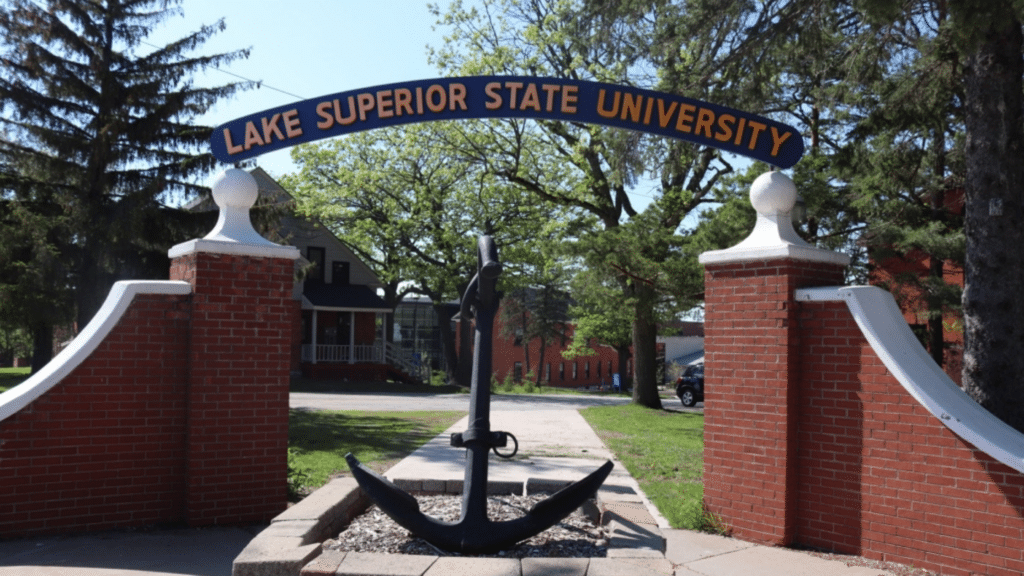
Lake Superior State University (LSSU) is a public liberal and technical studies university located at the Canadian border founded in 1946. It has 2,100+ enrolled undergraduate students who have access to a Student Recreation Center with four multipurpose tennis, volleyball, and basketball courts. There are 60+ campus organizations and clubs to keep students in a light mood.
It is the 1st four-year school in the US to offer a program in Fire Science that has received multiple accolades. LSSU ranks 46th in Regional Colleges Midwest and 46th in Top Performers on Social Mobility. It is one of the best universities in Michigan, and it ranks 3rd in Public Schools.
LSSU requires a minimum high school GPA of 2.4 and 2.0 GPA for transfer students. Submitting SAT and ACT scores are optional and will not affect the admissions process.
LSSU is active in most state and federal financial aid programs, with 90+ full-time students receiving financial aid. The amount awarded as a scholarship to qualified students ranges from $800 to $8000.
These are some majors that LSSU offers:
- Accounting
- Biology
- Cannabis Business
- Fire Science – Generalist
- Forensic Chemistry
- Geology English Language and Literature
- Integrated Science
- Kinesiology
- Medical Laboratory Science
- Nursing
- Political Science
- Robotics Engineering
- Social Science
Calvin College
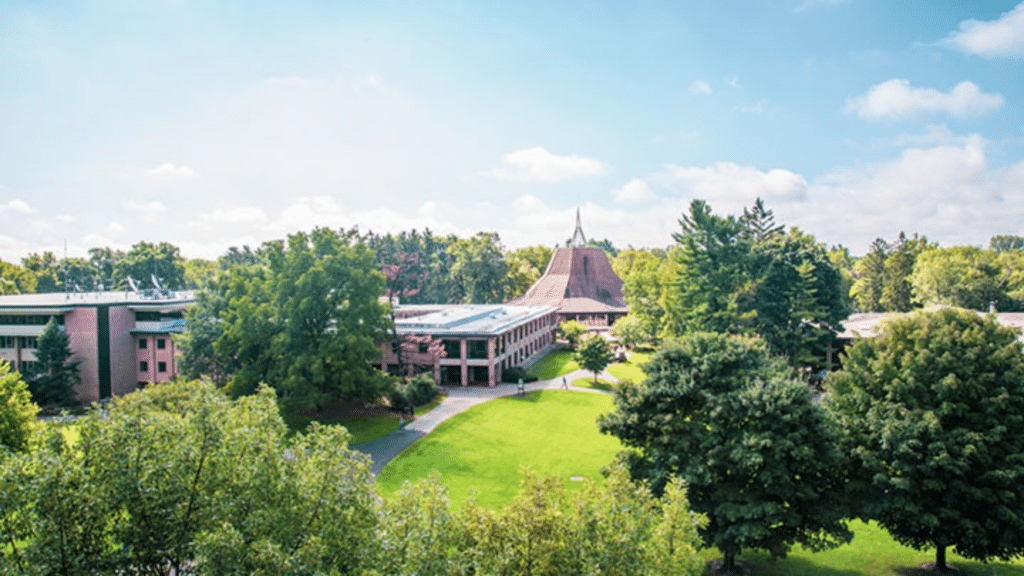
Calvin College is a private Christian institution founded in 1876 and is owned by the Christian Reformed Church. Students learn with courage; they act with justice and live with intention. Calvin College offers over 100 academic options and has a student-to-faculty ratio of 13:1. There are over 100 concerts, 80+ student organizations, film, and cultural events, sporting events, etc., to keep students active throughout the year.
It ranks 3rd in Regional Universities Midwest according to Michigan college ranking. Calvin comes 5th in Best Undergraduate Teaching and 13th in Best Value Schools.
Calvin College has a 73% acceptance rate and a 77% graduation rate. SAT scores ranged between 1112 to 1307, ACT scores ranged between 23 to 30, and high school GPA ranged between 3.62 and 4.10 in the 2019/2020 academic year.
Tuition costs $37,990, and the wellness fee costs $250 annually. Calvin grants an average financial aid package of $23,000 to families in need. This aid is in the form of scholarships, grants, loans, and up to 99% of students are recipients of financial assistance.
85% of Calvin 2016 graduates participated in a minimum of o1 internship. The graduate placement rate is a whopping 98%, and 99.5% of graduates from Calvin college in 2017 have jobs.
These are some available majors:
- Archaeology
- Bilingual Spanish Education
- Chemistry
- Digital Communication
- Finance
- Global Development Studies
- Human Resource Management
- International Designation
- Journalism
- Linguistics
- Ministry Leadership
- Optics
- Psychology
- Recreational Leadership
- Special Education
- Writing
Grand Valley State University
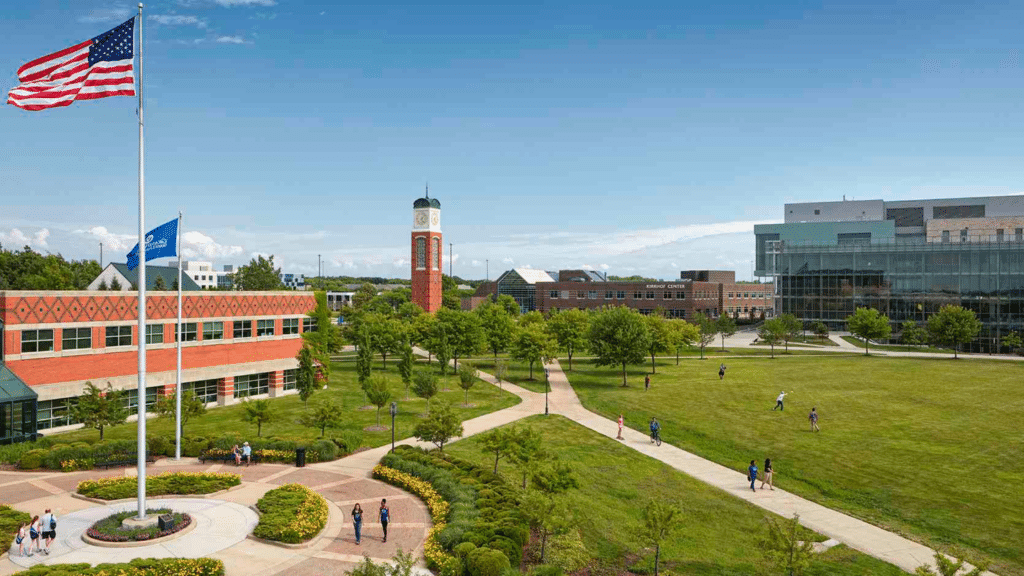
Grand Valley State University (GVSU) is a public institution that was founded in 1960. It has 23,350 students at different levels and offers 142 degrees with strong alumni of 130,974 students. It has over 300 student organizations, and eligible students can benefit from its 4000+ study abroad programs.
GSVU ranks 28th in Regional Universities Midwest, placing it among the best colleges in MI. It is the 8th in Most Innovative Schools, 3rd in Top Public Schools, and 21st in Best Value Schools.
GVSU has an 83% acceptance rate and a 66% graduation rate. The average scores for the Fall 2020 class were as follows: SAT scores between 1030 to 1230, ACT scores between 21 to 27, and GPAs between 3.4 to 3.96.
Michigan residents pay $13,560, while non-Michigan students pay $19,296 for tuition every year. GVSU offers 90% of students some form of financial aid. Over $90 million was distributed as scholarships and grants from $280 million for financial aid. 25% of students work with the faculty in research, and 90% of GVSU graduates are employed.
Here are some majors that GVSU offers:
- Advertising and Public Relations
- Biological Neuroscience
- Classics
- Dance
- Entrepreneurship
- Fisheries and Aquatic Sciences
- Health communication
- Information Technology
- Mathematics
- Nursing
- Operations Management
- Physics
- Sociology
- Theatre
- Wildlife Biology
Kuyper College
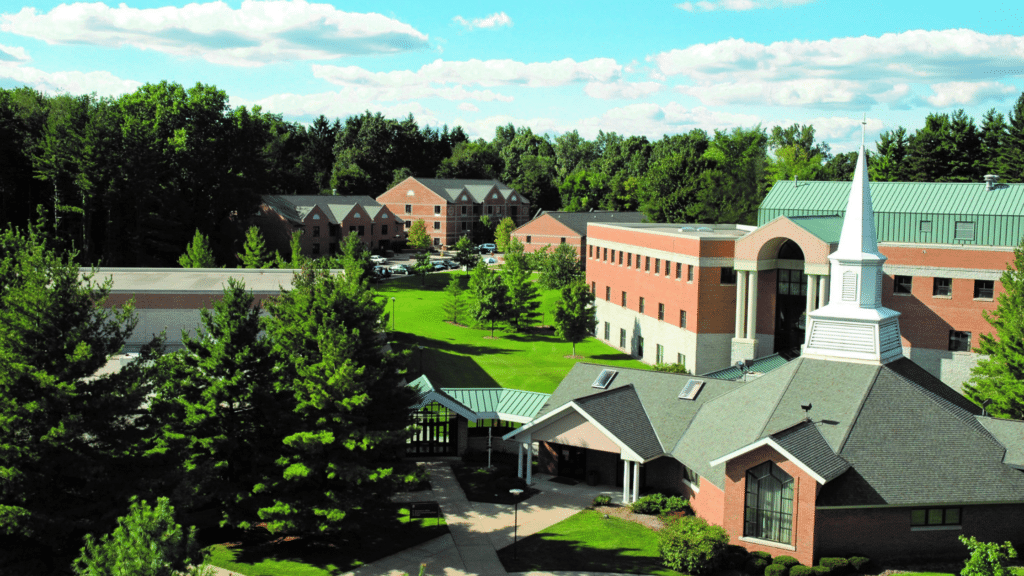
Kuyper College is a Christian college that was founded in 1939. It trains students to be the best academically and in their walk with Christ. It is a result-driven institution that takes hard work, Christ-centeredness, and dignity seriously. Lecturers use a rigorous curriculum that adds faith to the learning process. Kuyper uses a hands-on teaching approach with complete internships to help students practice.
Kuyper College ranks 56th in Regional Colleges Midwest and 68th in Top Performers on Social Mobility. It is 1 out of only ten colleges that the US Department designates as a Work College.
Kuyper has a 62% acceptance rate and a 55% graduation rate. Freshmen must have; a minimum GPA of 2.5, a combined SAT score of 960, or a composite ACT score of 18.
The average graduate salary, according to the most recent data, is $28,600 annually. Students pay $24,630 for full-time tuition every year. The average financial aid package is worth $17,879, and 100% of Kuyper students receive financial aid. Students who need a deferred payment plan need to fill the Deferred Payment Request Form.
Here is a list of what Kuyper College offers:
- Associate of Arts in Business Leadership
- Biblical Greek
- Education-Elementary
- Education-Secondary
- Interdisciplinary – Communication Studies
- Interdisciplinary – Psychology
- Interdisciplinary Studies
- Ministry Leadership
- Social Media Marketing
- Social Work
- Youth Ministry
University of Detroit Mercy
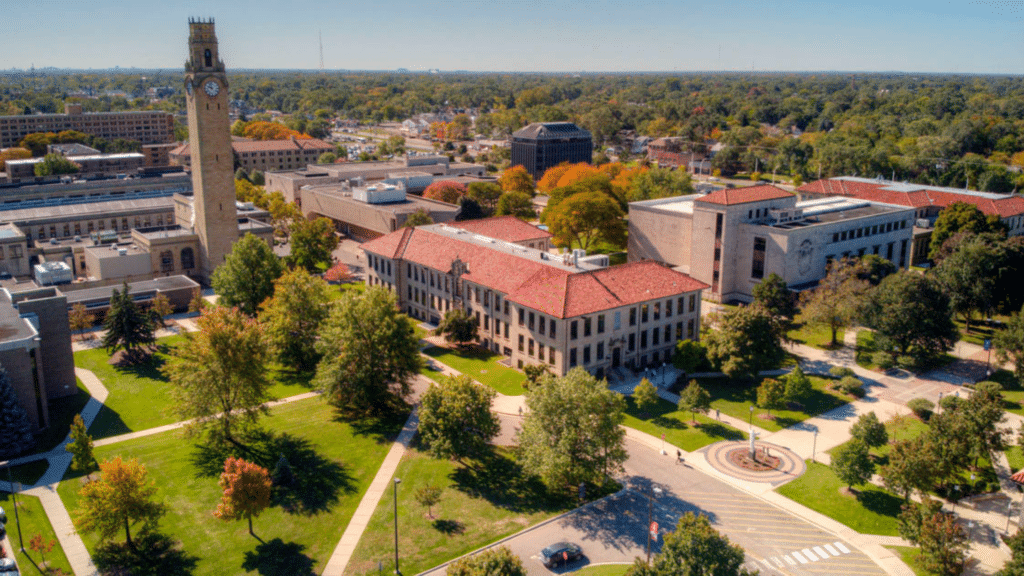
It is a private university that the Catholic church owns. It was founded in 1877 and now has 4,987 enrolled students. It is the only Mary and Jesuit school in the US. UDMercy strives to integrate spiritual, ethical, and intellectual growth in all students through its student-centered education format. It provides a rich college experience with over 70 organizations & clubs and a student-to-faculty ratio of 11:1.
UDMercy ranks 187th in National Universities, 34th in Best Value Schools, and 136th in Best Colleges for Veterans.
UDMercy has a 77% acceptance rate and a 68% graduation rate. Students have an average high school GPA of 3.6, an average SAT score of 1154, and an average ACT score of 25.
In 2020, UDMercy set aside over $42.2 million of its funds to offer financial aid through grants and scholarships. Students pay $29,416 for tuition and fees in one academic year. That is why 90% of students receive financial aid in some form.
Below is a list of some of its programs out of the 100+ academic programs that UDMercy offers:
- Addiction Science
- Business Administration
- Criminal Justice
- Dental Hygiene
- Electrical Engineering
- Health Services Administration
- Mathematics
- Nursing
- Philosophy
- Religious Studies
- Social Work
- Theatre
Why Study in Michigan?
Michigan is located at the US/Canadian border with a long freshwater coastline, thousands of lakes, and many more age-old trees that tell their own story. It has dynamic cities and small towns with an intriguing history and beautiful landscape. The cost of living in Michigan is lower than the US national average and is experiencing a rapid increase in employment opportunities. It is home to 111 higher education institutes that offer low cost of tuition and impressive financial aid. Additionally, it is one of the top 10 states where international students study in the US. Michigan has a high student population from diverse ethnicities and backgrounds, making new friends and building sustainable networks.
Conclusion
Michigan’s top 10 colleges use a robust education system that promotes self-learning, self-assurance, and collaboration with different professionals. They encourage students to take up more internships, participate in research and become better people for society. While some of these colleges do not require an application fee, others require a token. Despite stating a GPA, SAT, or ACT range, students are encouraged to do their best while applying, even if they have lower scores. Some of these colleges have special programs that let students with less than the required score in a particular area snag a position in the college.
References

